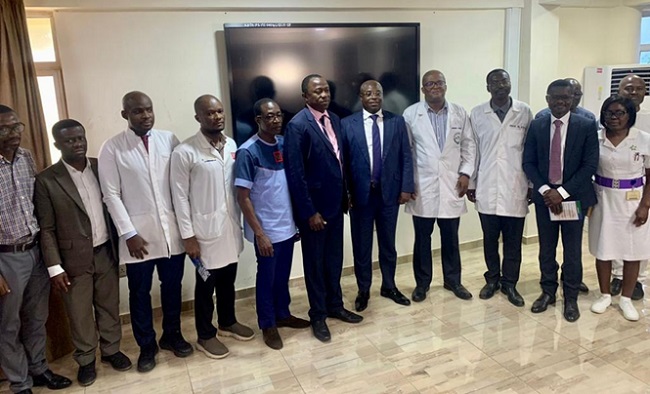Kutortse and Dr Ampomah (middle) with the medical team and staff of First Sky Group
The Chief Executive Officer (CEO) of the Korle Bu Teaching Hospital (KBTH), Dr. Opoku Ware Ampomah, has called on the government and legislative bodies to develop and pass a law that allows individuals to register their legal binding decision to be potential organ donors when they die.
This, he believes, will help to increase the number of organ donors, so when people die, they became productive in helping to save someone else’s life.
Speaking at the First Sky sponsored Post Kidney Transplant media briefing held in Accra, Dr. Ampomah said, “We need an enabling legislation that allows people to be able to say that, in the event of my death, you can harvest my kidney or organs to help someone who is in need of it.”
He added, “That is what advanced societies have done; they build a framework so that you can imagine that suddenly a large pool of organs become available for a lot of patients on dialysis.”
He stated that often patients do not find compatible donors among their relatives who are most willing to donate their kidneys.
He, therefore, emphasised that having an enabling legislation will help more transplant cases to take place to help shore up the numbers and also get more people off dialysis.
He believes this will also be a huge cost-saving initiative to the individual and the country as a whole.
He also disclosed that First Sky Group has over the years supported the treatment cost of kidney patients.
Executive Chairman for First Sky Group, Eric Seddy Kutortse, expressed the Group’s commitment to intensify its support to patients of the Renal Unit.
He disclosed that apart from the four patients sponsored by First Sky Group to have kidney transplants, three more will be supported to undergo transplant in August, 2023.
“For the first time in 2019, I sponsored a team from Birmingham in the United Kingdom to undertake transplant for 4 patients in Ghana, but what is remarkable is that the transplants that were done last week was done by a Ghanaian medical team,” he explained. “So that is a breakthrough … that is a landmark for all of us to celebrate.”
By Nafisatu Abdul Razak

